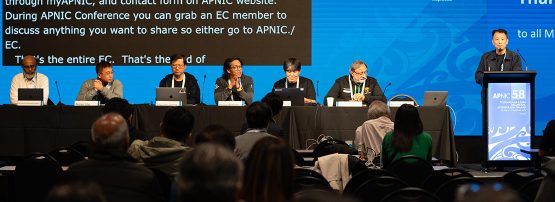
The APNIC Elected Leaders series celebrates the journeys and contributions of individuals who have stepped up to serve in volunteer leadership roles, helping to advance Internet operations across the Asia Pacific region. Through their stories, we hope you’ll gain insight into what motivates them, feel more connected to our community, and be inspired to get involved and help shape the future of the Internet.
Designing network topology and managing Border Gateway Protocol (BGP) peering is a long way from chairing the governing body of the Asia Pacific Regional Internet Registry (RIR), but that is how Dr Kenny Huang — Chair of the APNIC Executive Council (EC) and a lifelong contributor to the Internet operations community — began his career.
Dr Huang said his service to the community as Chair of the EC is focused on ensuring APNIC continues to operate effectively, with strategies that adapt to the rapidly shifting digital landscape.
“I lead the APNIC Executive Council, which is APNIC’s primary governing body. Along with the other members of the EC, I ensure the effective governance of the APNIC Secretariat and direct its long-term strategy. This involves representing APNIC Members between AGMs, monitoring Internet policy issues, overseeing the organization’s activities such as the annual budget and activity plan, and ensuring the implementation of Member decisions,” he said.
Building a foundation in applied computing
Dr Huang’s first job after university was as head of the network division at Academia Sinica, Taiwan’s premier research institution. In that role, he was responsible for infrastructure planning and establishing Internet connections with other research networks. His work ranged from designing network topology and developing systems to managing BGP peering.
“It was a rewarding experience where I learned a great deal about the entire process,” Dr Huang recalled.
“That position helped me understand the interplay between technical systems, institutional needs, and long-term planning.”
He credits his academic background — a MSc in Scientific Computing and Scientific Information Technology from London South Bank University and a PhD in Management of Information Systems from National Chengchi University — with laying a strong technical and analytical foundation for this work.
A pivotal moment came early in his career when he attended his first IETF meeting under the mentorship of Fred Baker, then Chair of the IETF.
“Fred guided me on how to engage in the IETF process, working with a team, exchanging ideas, and reaching consensus on proposals,” Dr Huang said.
“It was the greatest lesson I learned from the technical policy development process.”
Journey through Internet governance
Since then, Dr Huang has held leadership roles across many Internet organizations, both regional and global. A co-author of RFC 3743 on Internationalized Domain Names (IDNs), he has made notable contributions to Internet standards and multilingual domain name development, as well as broader policy and technical initiatives.
He is also an active voice in global governance forums, including ICANN, the Number Resource Organization (NRO), and the Internet Society (ISOC). His work bridges technical protocol development, policy advocacy, and government advisory roles in Taiwan.
“I’ve served in many roles, including APNIC Policy SIG Chair and NRO Number Council member, and contributed to policy development at both the regional and global levels.”
His technical background, he added, remains essential.
“Understanding Internet standards and protocols allows me to make informed decisions on critical issues such as routing security, IPv6 deployment, and address policy,” he said.
Facing our challenges as a community
Among the challenges facing the Internet community today, Dr Huang points to the slow transition to IPv6 and the growing risk of Internet fragmentation as urgent challenges.
“Despite IPv4 exhaustion, much of the Internet still relies on IPv4 and Network Address Translation (NAT), leading to inefficiencies and a loss of end-to-end connectivity,” he said.
“APNIC Labs estimates a full IPv6 transition could take until 2045. We need to do more to accelerate adoption.”
But more concerning, he said, is the increasing politicization of Internet governance.
“Internet fragmentation is no longer just a technical concern. It’s being driven by policy, regulatory, and commercial decisions that could split the Internet into isolated segments,” Dr Huang warned.
“Geopolitical tensions are increasingly affecting Internet governance, including RIR operations. The Internet is now a strategic asset, and decisions on IP address allocation and routing can carry significant political weight. This challenges the multistakeholder model, risking politicization of technical functions and potentially undermining the neutrality and stability of the Internet’s infrastructure.”
A call for action from the community
Dr Huang encouraged APNIC Members and the broader community to stay actively involved in policy development and operational discussions.
“Community input is vital,” he said.
“Subscribe to the Policy SIG mailing list, attend APNIC meetings, and consider submitting policy proposals. Every contribution helps guide APNIC’s evolution.”
He also stressed the importance of engagement beyond the APNIC community.
“We need to educate policymakers, push back against data localization mandates, and advocate for open standards in regional and global forums.”
To counter fragmentation, Dr Huang outlined three priorities:
- Champion a unified Internet: Support multistakeholder governance and oppose policies that lead to Balkanization.
- Strengthen technical foundations: Accelerate IPv6 adoption and implement routing security measures such as RPKI.
- Promote education and collaboration: Build awareness among governments and encourage dialogue across sectors.
“The Internet is a shared resource. Preserving its global, open nature requires ongoing collaboration across technical, policy, and civil society domains,” Dr Huang said.
Dr Kenny Huang’s term as APNIC EC Chair runs until March 2027.
The views expressed by the authors of this blog are their own and do not necessarily reflect the views of APNIC. Please note a Code of Conduct applies to this blog.
